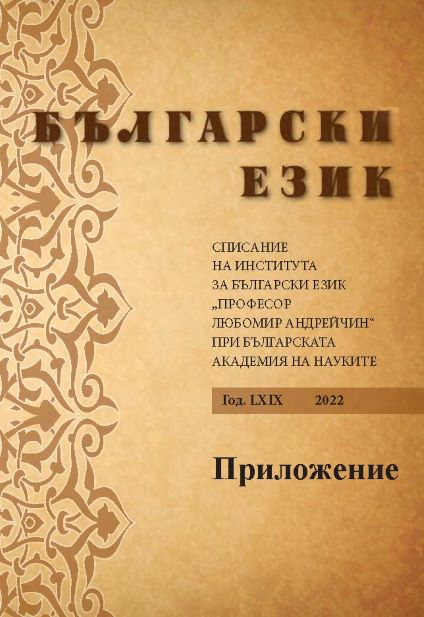Инструментално кодиране на стимула и диахронното развитие на глаголите за емоционално състояние в руския език
Instrumental Encoding of the Stimulus and the Diachronic Development of Verbs of Emotion in Russian
Author(s): Maria OvsjannikovaSubject(s): Language studies, Language and Literature Studies, Theoretical Linguistics, Applied Linguistics, Philology
Published by: Институт за български език „Проф. Любомир Андрейчин“, Българска академия на науките
Keywords: verbs of emotion; Russian; diachrony; metaphor; stimulus; instrumental case
Summary/Abstract: The paper examines the emergence of emotive meanings on the basis of physical meanings. I analyse three sets of Russian verbs: восхитить(ся) / восхищать(ся) ‘admire’, смутить(ся) / смущать(ся) ‘embarrass’, поразить(ся) / поражать(ся) ‘amaze’. The focus is on their use in the texts from the 18th century and the first half of the 19th century included in the Russian National Corpus. I compare transitive constructions, constructions with passive participles and reflexive constructions. Emotive meanings emerge as a result of a metaphorical transfer. The study shows that this transfer occurs primarily in transitive constructions. Passive participles and reflexives show lower frequency of physical uses than transitive verbs. In transitive constructions, the participant experiencing the emotion is expressed as a “mental part” (heart, soul) rather than as a person more frequently than with reflexives and passive participles. Another trace of a metaphorical transfer is the use of emotions as causers, cf. поражен унынием ‘stricken by grief’, which indicates that the verb describes an effect of the emotion rather than the emotion itself. Emotions are expressed as subjects more rarely than in the instrumental case. In 19th-century texts the verbs show lower frequency of physical uses, of uses with “mental parts” as undergoers and of uses with emotions as causers. Diachronically, the instrumental objects in transitive, participial and reflexive constructions are viewed as syntactically parallel and manifesting the same variation. In modern Russian, the instrumental object in reflexive constructions is viewed as lexically specified, while in transitive and participial constructions its use is constructionally motivated.
Journal: Български език
- Issue Year: 69/2022
- Issue No: Special
- Page Range: 429-440
- Page Count: 12
- Language: Bulgarian

